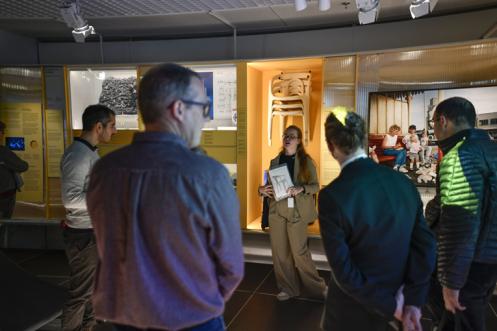
L'équipe de la Maison de l'histoire européenne propose un voyage captivant et stimulant à travers l'histoire européenne. Plongez-y à l'heure du déjeuner et découvrez les nouvelles expositions permanentes et temporaires. Un guide de nos équipes d'apprentissage, de conservation ou d'événements vous conduira vers des objets qui révèlent les processus et les phénomènes qui ont façonné le continent. Suivez le parcours sur six étages et vivez l'histoire de l'Europe comme jamais auparavant ! Les visites sont gratuites et ont lieu de 12h15 à 13h00 en anglais. Aucune réservation n'est nécessaire.
January - Countries that ceased to exist
Countries come and countries go. Let’s have a closer look at countries (partly) situated on the European continent that no longer exist.
9 January
Austria-Hungary
Let’s travel back in time to learn more about the Austria-Hungarian Empire and the role it played in European history.
16 January
Ottoman Empire
Let’s travel back in time to learn more about the Ottoman Empire and the role it played in European history.
23 January
Yugoslavia
Let’s travel back in time to learn more about Yugoslavia and the role it played in European history.
30 January
USSR
Let’s travel back in time to learn more about the USSR and the role it played in European history.
February - What’s love got to do with it?
Love makes the world go round! The House of European History holds many lovely objects and stories. Come discover them and fall in love with history.
6 February
Feelings
I feel it in my fingers, I feel it in my toes. Let’s look at the different feelings that played a part in European history.
13 February
Valentine’s Day
The museum is the perfect place for a romantic date! Surprise your Valentine with a tour and discover the many loving stories in our collection!
20 February
Do you love your language?
I love you, Je t’aime, Ich liebe dich, Rakastan sinua, Σ' αγαπώ... come and share your love for your mother tongue because this week it is also the ‘International Mother Language Day’!
27 February
LOVE IS LOVE!
Let’s take a closer look at some stories from the LGBTQIA+ community, their struggle to love who they want and the waves they made in European history. Love wins!
March - Reflection on our collection
The House of European history is a place for discussion and debate. Looking from different perspectives is important to truly understand the topics that are addressed in our collection. Let’s ask ourselves some questions about difficult topics and reflect how they should or should not be represented.
5 March
Colonialism
From the fifteenth to the twentieth century, European countries established colonies all over the world. European colonial powers inflicted misery, inequality and racism on the peoples they had colonised while growing wealthier themselves. Eventually they relinquished their colonies voluntarily or were forced to give them up. Let’s reflect on how we address this topic in the museum.
12 March
War Crimes
The atrocities of war are a difficult topic to discuss. Can we even find the right words to describe certain events in history? Let’s have a closer look on how we approach it in the museum.
19 March
Gender balance
The call for ‘herstory’ has become louder over the years. Let’s look at the representation of gender and the partition of different voices in our collection.
26 March
Memorials
How do we choose collectively what to remember and what to forget? Should we still erect monuments for people today? And what to do when those memorandum cause harm to certain people? Let’s delve deeper into different memorials in our collection.
